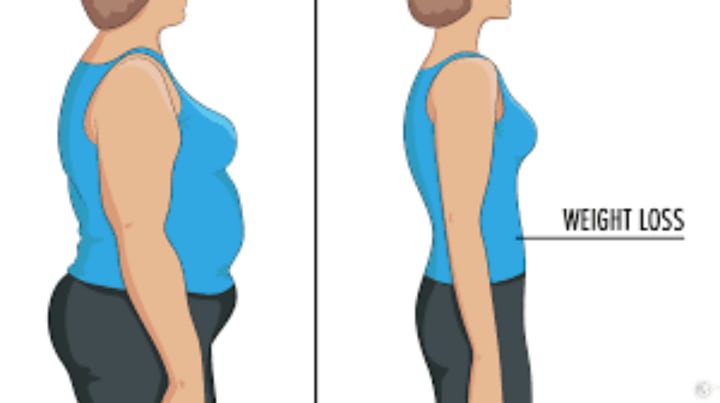
Polycystic ovary syndrome (PCOS) is a common hormonal disorder that affects up to 10% of reproductive-aged women. One of the hallmark features of PCOS is insulin resistance, which can make it difficult for women with PCOS to lose weight. However, making lifestyle changes can be an effective way for women with PCOS to manage their symptoms and improve their overall health. In this part, we will discuss some of the lifestyle changes that can help with weight loss in PCOS.
1.Regular exercise: Exercise is an essential component of weight loss for women with PCOS. Exercise helps to increase insulin sensitivity and improve glucose uptake in muscles, which can help to reduce insulin resistance. Additionally, exercise can help to reduce inflammation and improve mood, which can be beneficial for women with PCOS who often experience mood disorders.
The American College of Obstetricians and Gynecologists (ACOG) recommends that women with PCOS engage in at least 150 minutes of moderate-intensity aerobic activity per week. Examples of moderate-intensity aerobic activity include brisk walking, cycling, swimming, or dancing. Resistance training, such as lifting weights or using resistance bands, can also be beneficial for women with PCOS. Resistance training can help to increase muscle mass, which can help to improve insulin sensitivity and metabolic function.
2.Dietary changes: Making dietary changes can also be helpful for women with PCOS who are looking to lose weight. A diet that is high in protein and fiber and low in carbohydrates can be particularly effective for reducing insulin resistance and promoting weight loss.
Some specific dietary changes that can be helpful for women with PCOS include:
# Reducing intake of high-glycemic index (GI) carbohydrates, such as refined grains and sugary foods.
# Increasing intake of fiber-rich foods, such as fruits, vegetables, and whole grains.
# Increasing intake of protein-rich foods, such as lean meats, fish, and legumes.
# Avoiding trans fats and limiting saturated fats.
# Eating regular, balanced meals throughout the day to help regulate blood sugar levels.
3.Stress management and sleep: Stress and poor sleep can both contribute to insulin resistance and weight gain in women with PCOS. Therefore, managing stress and improving sleep quality can be important for PCOS management and weight loss.
Some strategies for managing stress and improving sleep quality include:
# Engaging in relaxation techniques, such as deep breathing or meditation.
# Getting regular exercise, which can help to reduce stress and improve sleep.
# Practicing good sleep hygiene, such as avoiding screens before bed and creating a relaxing sleep environment.
# Seeking support from a mental health professional or support group if needed.
5.Behavior modification and support systems: Finally, behavior modification and support systems can be crucial for helping women with PCOS maintain weight loss over the long term. Behavior modification strategies may include setting realistic goals, tracking progress, and identifying and addressing barriers to weight loss.
Support systems may include working with a registered dietitian or exercise specialist, joining a support group, or seeking support from family and friends. Additionally, research has shown that participation in a comprehensive lifestyle intervention program that includes both diet and exercise components can be effective for weight loss and improving metabolic health in women with PCOS.
READY TO SHED THOSE EXTRA POUNDS? OUR WEIGHT LOSS PRODUCT CAN HELP – ORDER TODAY..! https://tinyurl.com/yc8bwv6x

In addition to lifestyle changes, there are also medical interventions that can be helpful for women with PCOS who are struggling to lose weight. Medical interventions can be particularly helpful for women with severe insulin resistance or who have not been able to achieve significant weight loss through lifestyle changes alone. In this part, we will discuss some of the medical interventions that can be effective for weight loss in PCOS.
6.Metformin: Metformin is a medication that is commonly used to treat type 2 diabetes, but it is also used off-label for PCOS management. Metformin works by reducing glucose production in the liver, which can help to improve insulin sensitivity and reduce insulin resistance. Additionally, metformin may help to decrease appetite and promote weight loss.
Several studies have shown that metformin can be effective for weight loss in women with PCOS. However, the amount of weight loss achieved with metformin varies widely, and not all women with PCOS will respond to metformin. Additionally, metformin can cause gastrointestinal side effects, such as nausea and diarrhea, which can be bothersome for some women.
7.Orlistat: Orlistat is a medication that is approved by the FDA for weight loss. Orlistat works by inhibiting the absorption of dietary fat in the intestine, which can lead to weight loss. Orlistat is not specifically approved for PCOS, but it can be used off-label for PCOS management.
Several studies have shown that orlistat can be effective for weight loss in women with PCOS. However, like metformin, not all women with PCOS will respond to orlistat. Additionally, orlistat can cause gastrointestinal side effects, such as oily stools and diarrhea, which can be bothersome for some women.
8.Anti-androgen medications: Women with PCOS often have elevated levels of androgens, such as testosterone, which can contribute to insulin resistance and weight gain. Anti-androgen medications, such as spironolactone and flutamide, can be effective for reducing androgen levels in women with PCOS.
Several studies have shown that anti-androgen medications can be effective for weight loss in women with PCOS. However, these medications can have side effects, such as breast tenderness and menstrual irregularities, which can limit their use.
9.Bariatric surgery: Bariatric surgery, such as gastric bypass or sleeve gastrectomy, is a surgical procedure that is used for weight loss in people who are severely obese. Bariatric surgery can be effective for weight loss in women with PCOS who have a body mass index (BMI) of 40 or higher, or a BMI of 35 or higher with other health conditions, such as diabetes or hypertension.
Several studies have shown that bariatric surgery can be effective for weight loss and improving metabolic health in women with PCOS. However, bariatric surgery is a major surgical procedure that carries risks, such as infection, bleeding, and nutritional deficiencies. Additionally, bariatric surgery is not appropriate for all women with PCOS, and it is important for women to discuss the risks and benefits of bariatric surgery with their healthcare providers.
READY TO SHED THOSE EXTRA POUNDS? OUR WEIGHT LOSS PRODUCT CAN HELP – ORDER TODAY..! https://tinyurl.com/yc8bwv6x
In conclusion, weight loss is an important aspect of managing PCOS. Women with PCOS who are overweight or obese may experience a range of symptoms related to insulin resistance and androgen excess. Lifestyle changes, such as diet and exercise, are the first-line approach to weight loss in PCOS. However, medical interventions, such as metformin, orlistat, anti-androgen medications, and bariatric surgery, can be helpful for women who have not been able to achieve significant weight loss through lifestyle changes alone. It is important for women with PCOS to work with their healthcare providers to develop a personalized plan that takes into account their unique health needs and goals.
About the Creator
Enjoyed the story? Support the Creator.
Subscribe for free to receive all their stories in your feed. You could also pledge your support or give them a one-off tip, letting them know you appreciate their work.






Comments
There are no comments for this story
Be the first to respond and start the conversation.